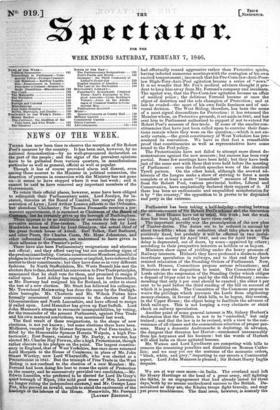Parliament has been taking a half-holy-day—resting between the announcement of
Sir Robert Peel's scheme and the discussion of it. Both Houses have sat as usual, this week ; but the work done has been light, and they have risen early. The important novelty- was the promulgation of the new plan of Timber-duties. The duties are to be reduced in amount by about two-fifths : when the reduction shall take place is not yet positively fixed, but probably it will be effected in two instal- ments--one moiety for April 1847, and one for April 1848. The delay is deprecated, out of doors, by some—approved by others ; according to their prospective interests as holders or as buyers.
Ministers show signs of yielding under the heavy .pressure of Railway interests. Hitherto they have professed a desire to check inordinate speculation in railways, and to that end they have resisted relaxation of the Standing Orders of Parliament. Now-, in both Houses, Committees propose serious relaxations ; and Ministers show no disposition to resist. The Committee of the Lords advise the suspension of the Standing Order which obligee a deposit of 10 per cent to be paid by the 6th of February ; recom- mending that only 6 per cent should be exacted the other 5 per cent to be paid before the third reading of the bill on account of which it is payable. The Committee of the Commons propose to waive the privilege which prevents the Lords from originating money-clauses, in favour of Irish bills, to be begun, this session, in the Upper House ; the object being to facilitate the advance of Irish railways. This is not keeping a very obstinate or strict check on railway speculation. Another point of some general interest is Mr. Sidney Herbert's declaration that the Militia is not to be "embodied,' but only trained ; and that the law is to be revised, with a view to the con- venience of all classes and the commodious selection of proper per- sons. Many a domestic Andromache is deploring, in advance, the dangers that threaten her Hector—summoned unseasonably from kis Astyanax and his business : but the words of Herbert will shed balm on those agitated bosoms. Mr. Watson and Lord Lyndhurst are competing with bills to remove the remaining penalties and disabities on Roman Catho- lics; and we may yet see the costume of the monastic orders, "black, white, and grey," imparting to our streets a Continental aspect. Lord John Manners is pleased ; Sir Robert Harry Inglis despairs.


























